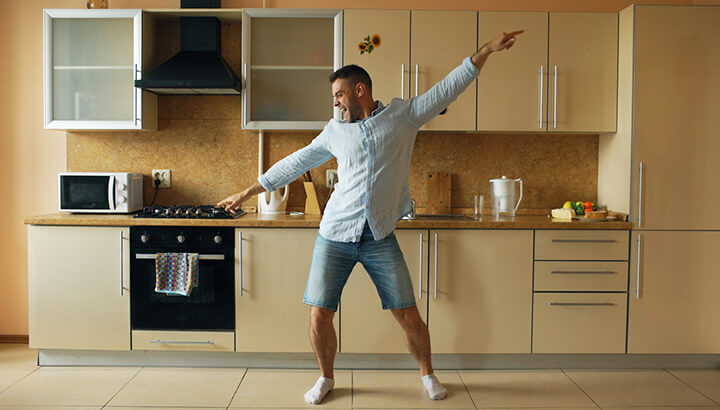We all experience anxiety on some level. If you experience it regularly, some well-meaning person has probably recommended meditation as a remedy. What happens if you don’t like meditation? Are you just supposed to live with your anxiety? Of course not. That’s why we’ve pulled together a list of 15 ideas for reducing anxiety that don’t involve meditation.
De-clutter
By now, you’ve probably heard of “The Life-Changing Magic of Tidying Up” by Marie Kondo. Obviously, there are benefits to de-cluttering your life in a physical sense, but it also influences your mental state. De-clutter mentally by journaling out your day, taking five minutes of silence for yourself by turning off the television and setting your electronic devices aside, or physically tidying up your workspace to make things seem less overwhelming.
Smile
Smiling can help reduce your stress level — even if you’re faking it. In a 2012 study, participants were challenged with stress-inducing tasks. Some were asked to hold a neutral expression — achieved by asking participants to hold a set of chopsticks with their lips — and others were asked to smile during these tasks. Other participants smiled with awareness, others without. Some even held a chopstick in their mouth to produce a Duchenne smile, which we recognize as a genuine smile. The results found that smiling while you’re stressed helps you recover from it better. While scientists aren’t sure exactly why it happens yet, it’s still a great argument for smiling in the face of your anxiety.
Express gratitude
If you live with anxiety — especially if you experience anxiety attacks — it can be very easy to default to noticing the worst in every situation. To an extent, this is normal. The brain is continually looking for errors in the environment to keep us safe, and it’s far easier to believe the bad that it is the good — it’s something called the Negativity Bias. But, if you can consciously express gratitude, through a gratitude journal, recording yourself speaking about what you’re thankful for on your phone, or by painting or drawing with gratitude, you might find your anxiety levels drop.
Make a to-do list
Having a lot of things to do can feel overwhelming. Often, it seems like you have so much more to do because you’re trying to keep everything in your head. Recently, I felt overwhelmed by everything that I “had” to do; I was sure there were 20 some items on my mental to-do list. Once I put pen to paper, I realized that there were only six things I had to do by the end of the month. Six! In many ways, I was creating my own stress and anxiety. When you sit down to make a to-do list, make sure to use it and mark your done items off as you complete them. You’ll receive a little spike of dopamine, the reward neurotransmitter, as a result.
Create a vision board
You probably know at least one person who has created a vision board. They likely have their dream vacation, their dream car or their dream fitness level plastered on it. But what about a vision board focused on how you want to feel? Page through your old magazines and newspapers and find images and words that convey the feelings you want to bring forward. They might be emotions like happiness, contentment or love or they might be physical feelings like warmth or safety. Create a vision board to help you remember the things you do want to feel when you aren’t feeling your best.
Reduce caffeine
If you’ve ever had too much coffee, you know how jittery it can make you. In fact, some psychologists warn that the heart-racing, jittery feeling that can be mistaken for an anxiety attack might be too much caffeine. Especially if you do live with anxiety and you love coffee or tea, it’s a good idea to reduce your intake. If you tend to be anxious, then too much caffeine can just make your symptoms worse.
Breathe deeply
The fight-or-flight mode has multiple effects on the body, not the least of which is faster, shallower breathing. When your body is in the stress response, it’s preparing to avoid or confront a threat. With time, it’s easy to become triggered by smaller day-to-day, non-life-threatening events so that you’re in a continual stress state. One of the effects of that state is your breathing isn’t supportive. By breathing deeply, you can interrupt the stress response and put your body in a state of relaxation. To do this, simply sit or lie down. Place your hands on your belly and breathe so that your hands move up and down with the abdominal muscles.
Dance it out
Have you ever cranked up the radio when you were stressed or angry? Next time, turn the music up and dance with it. Like other forms of exercise, dancing helps you think about something other than what’s stressing you out. Even if you have no formal training, shaking your groove thing can have major emotional benefits and put you in a better mood. It’s so effective that people are seeking out dance movement therapists to help them with severe anxiety, depression, PTSD and other trauma.
Get out in nature
Nature is incredibly healing. Next time you feel anxiety creeping in, tie your walking shoes on and get moving outside or sit under the shade of the tree in your yard. Being around nature grounds you and the bonus of fresh air and vitamin D after several hours indoors can’t be understated. In fact, nature can even help soothe your physical pain, as a study conducted by Dr. Robert Ulrich found. Patients who had a view of trees after gallbladder surgery tolerated pain better and spent less time in the hospital. So, if your anxiety brings headaches with it, nature may help with that too.
Play
Play can have a huge impact on your anxiety levels. Recent research has found that when children aren’t able to play as often during the day, their anxiety and depression increase. It’s not unreasonable to conclude that a lack of play has a similar negative effect on adults. The physical movement and laughter that accompanies a game of hide-and-go-seek with the children in your life or the challenge of a video game can help you disconnect from your worries. Sign up for an adult soccer or volleyball team, or make it a point to shoot some hoops with your friends more often for increased anxiety relief.
Stop “should-ing” all over yourself
It’s very easy to take on tasks that you feel like you “should” do, or “have” to do. Take some time each week to look at the things on your to-do list. Then, notice the things that have to get done and the things that you would like to complete. For instance, you have to go to work because you have bills to pay, but you may want to go to the bookstore to grab the latest book in your favorite series. Likewise, replace the word “should” with “I would like” when you speak to yourself or others. It will help you decide how important it is to you — and how much you’re acting from a sense of obligation.
Accept your anxiety
Believe it or not, accepting your anxiety can help you deal with it. There’s a lot of talk about fighting anxiety but, simply put, fighting is a function of the stress response. What if instead of trying to fight anxiety, you accepted that sometimes anxiety creeps into your life? The anticipation of a panic attack can be the worst part of anxiety for some people. Recognizing that you will have bad days but that it doesn’t make you a bad person — or a failing person — can help reduce your anxiety. If you can, think of it as a grumpy relative or a suddenly dark and stormy day. Sometimes the best thing you can do is just do the best you can with the situation you’re given, and that’s okay.
Use essential oils
Most of us are aware that lavender has calming effects, but there are a number of other essential oils that can help reduce your anxiety with just a couple of drops. Rose essential oil is said to help you through a panic attack, and vetiver oil can give you a sense of grounded reassurance. Ylang ylang can help boost your happiness and reduce fear, while bergamot oil is a good option if your anxiety comes with insomnia; the oil is said to help induce a sense of relaxation. Diffuse one of these oils at your office or home. You can also dilute one with your favorite carrier oil and use it as perfume to carry it with you throughout the day.
Cancel subscriptions you don’t use
One of the most common sources of anxiety originates in our finances. It’s very easy these days to sign up for a subscription thinking you will cancel before the free trial expires and then forget about it. Or, if you’re like me, you and your partner both have a subscription to Netflix but only ever use one. Cancel the subscriptions you no longer use or can live without. It will leave you with fewer bills throughout the month, and less anxiety about your bank account.
Take a bath
It’s practically cliché to tell someone to self-care by taking a bath. However, doing so with Epsom salt may be the key to reducing your anxiety levels. Studies have shown that magnesium deficiency can contribute to anxiety. While there is a lack of peer-reviewed studies about the effects of magnesium in Epsom salt being absorbed through the skin during bath time, there are plenty of anecdotal references that suggest it can help restore magnesium levels in the body. Not only that, but the warmth from the bath water can calm the nervous system and help regulate anxiety.
Do you have another anxiety relief method we haven’t covered?
— Megan Winkler







